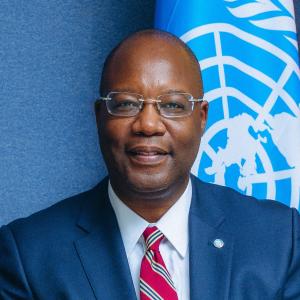Permanent Secretary, Ministry of Gender, Labour and Social Development, Mr. Aggrey Kibenge,
The Representative of the EU Delegation in Uganda, Ms. Karolina Andrzejewska,
The Representative of the Royal Netherlands Embassy in Uganda, Ms. Elin Hilwig,
Heads of Agencies and Representatives, the United Nations in Uganda,
Representatives of the Government of Uganda Ministries, Departments and Agencies,
Representatives of the Uganda Civil Society National Reference Group
Ladies and Gentlemen,
It is a pleasure for me to attend my first Oversight Committee meeting for the Spotlight Initiative 2.0 in Uganda. I am honoured to pick up the leadership reigns of a programme that is in its second iteration and is poised to leave a mark with regards its contribution to ending Violence Against Women and Girls in Uganda.
Allow me to start by congratulating the Government of Uganda and celebrating the shifts in social norms that have increased the ratio of girls that stay in school over the last five years. The Government of Uganda must be commended for successful measures like the Second Chance in Education Programme, which aims to mitigate the school drop out of girls and encourage re-entry into the school system. Now we must ensure that the schools are better prepared to accommodate these returning girls and implement measures to reduce stigma and discrimination through empowerment- based messaging.
The task before the Spotlight Initiative 2.0 is clear. The 2022 UDHS findings reveal that of the women and men aged 20-49, 40% of the women were married by 18 years of age, compared to only 11% of their male counterparts. The same findings state that 52% of these women aged 15-49 experience emotional, physical, or sexual violence committed by their current or most recent partner.
So not only are these girls deprived of education and the skills required to empower and transform their lives, but they are also thrust into a lifetime of violations of their most basic human right to safety and bodily integrity. If the investment in human capital development is to yield progress, this loss of potential must be addressed.
The UNICEF Policy Note No.1/2024 titled ‘Overcoming the Challenges of Education in Uganda’ highlights structural issues compounding the low girl - child participation in education. These issues occur within a context of negative parental and student attitudes towards education, with teenage pregnancies and early marriages leading to a higher dropout rate for girls. Out of the approximately 42.8 per cent of pupils who start primary school and do not complete primary seven (P.7), 46.4 per cent are female pupils[1].
The First Lady Janet Museveni, who also serves as the Minister of Education and Sports, has been clear that this is an issue that demands our urgent attention, because secondary school is critical in developing and reinforcing children's academic foundations.
The Spotlight Initiative 2.0 in Uganda under the Gender for Development in Uganda focuses on Ending Violence Against Women and Girls, early marriages and female genital mutilation as priority areas for creating a conducive environment for girl child retention and transition in education. Recognising that resource flows to the education sector contribute only 5 per cent of the total ODA to Uganda, and government spending towards education in absolute terms stands at about 6% of the total national budget, the United Nations remains committed to enhancing delivery efficiencies through, among other operational measures, Delivering as One to make sure that every dollar counts.
I take this opportunity to express our gratitude to the European Union Delegation in Uganda for the investment of Euro 20 million into the Spotlight Initiative 2.0 programme. This was part of a broader Euro 60 million support to the Gender for Development in Uganda (G4DU) programme.
It is my singular privilege to formally welcome into the Spotlight Initiative family the Netherlands Embassy in Uganda. It is motivating to witness local development partners supporting us in our reforms towards development synergies with pooled funding towards joint programming under the Team Europe Initiative. This will strengthen coordination and improve delivery efficiencies and effectiveness as we use tour support to expand the programme coverage to an additional 5 districts, where convergence with the other implementing partners of the G4DU will increase our impact and the benefits delivery to our target groups. As we receive the Euro 8 million, we say “Welcome to the family”, and promise that a proper ‘feast’ shall be held in your honour.
Through the leadership of my Office as the Resident Coordinator, implementation shall continue to be conducted by the five agencies that pool their collective expertise and commitment, namely UNDP, UNICEF, UNHCR, UNFPA and UN Women.
As always, my office remains cognizant of the political will and commitment of the Government of Uganda through the Ministry of Gender, Labour and Social Development. The Permanent Secretary, Mr. Aggrey Kibenge, and the Commissioner for Gender, Angela Nakafeero, have been unflagging in their strategic support and active participation in the design, implementation and coordination of the programme.
Thank you for coming, and I look forward to us having fruitful deliberations.
[1] Uganda National Examinations Board (Uneb) and Education and Sports Sector Annual Performance Reports (ESSAPRs





